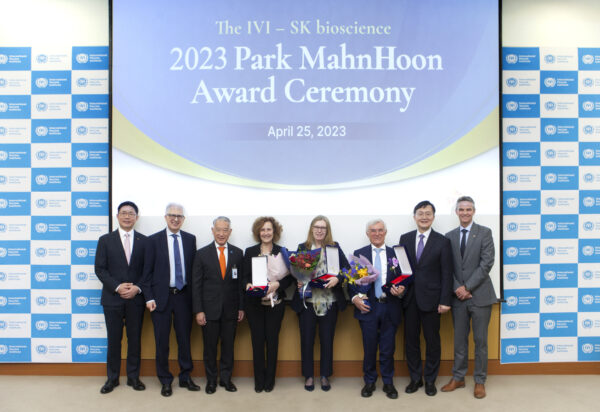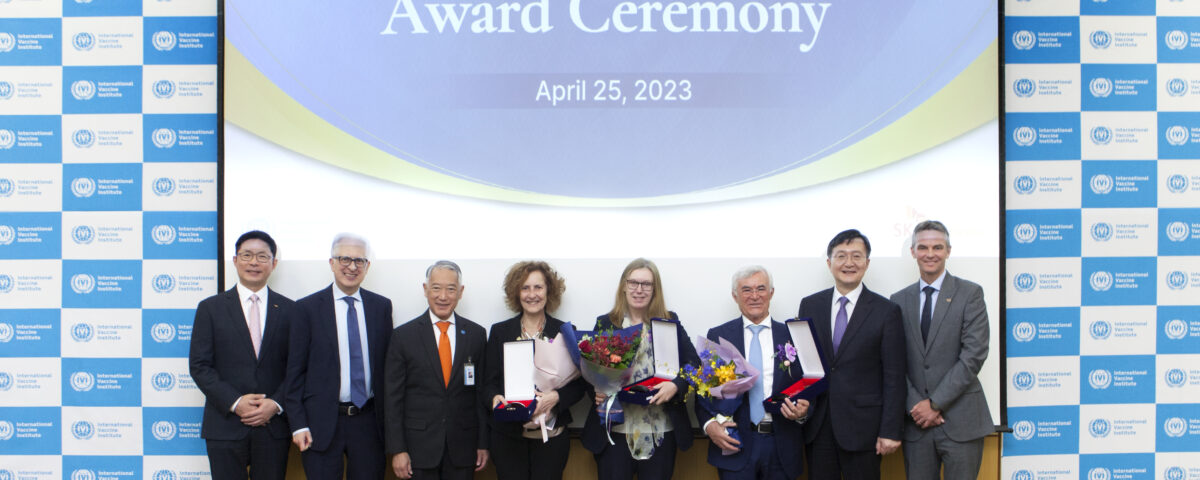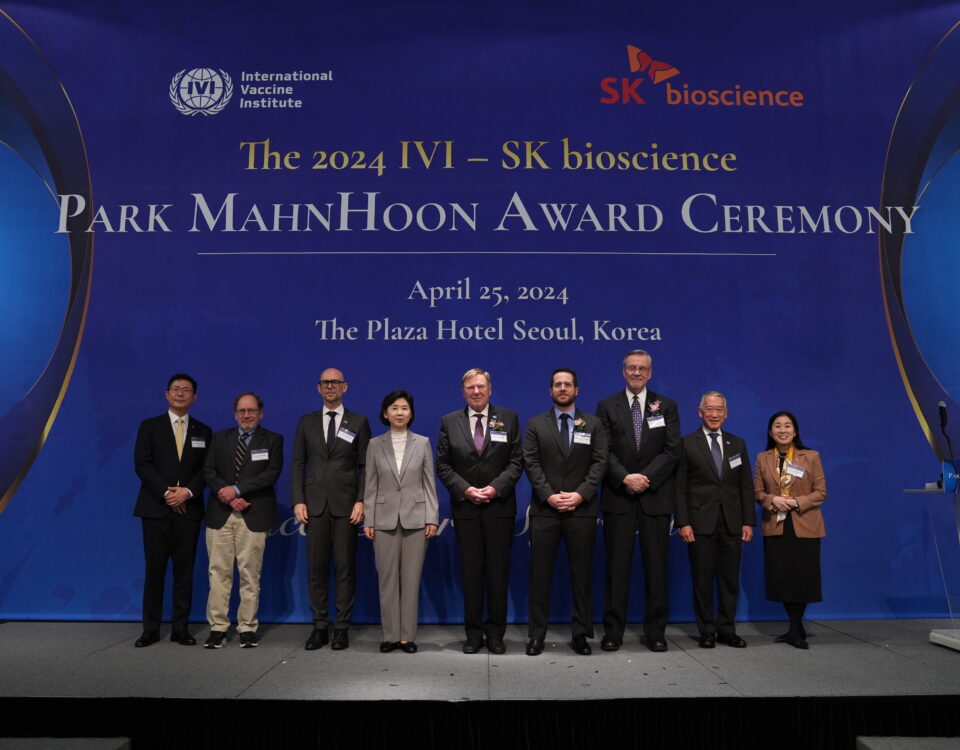- Awardees give lectures to highlight their work and achievements, share knowledge at the Award Forum

Three of the awardees pose for a commemorative photo with key participants during the 2023 IVI – SK bioscience Park MahnHoon Award at IVI headquarters in Seoul, Korea on April 25. From left: SK bioscience CEO Jaeyong Ahn, H.E. Federico Failla, Italian Ambassador to Korea, IVI Director General Dr. Jerome Kim, Dr. Mariagrazia Pizza, Prof. Sarah Gilbert, Dr. Rino Rappuoli, Prof. Hong-lim Ryu, President of Seoul National University, Mr. Gareth Weir, Deputy Head of the UK Mission to Korea.
April 26, 2023 – SEOUL, Korea – The International Vaccine Institute (IVI) gave the 2023 IVI-SK bioscience Park MahnHoon Award to Drs. Rino Rappuoli and Mariagrazia Pizza as co-recipients for their development of new scientific approach to the development of all vaccines, and Profs. Sir Andrew Pollard and Dame Sarah Gilbert of Oxford University as co-recipients for their work on COVID-19 and other vaccines.
Joining the Award Ceremony, held on April 25, 2023, at IVI headquarters in Seoul were Drs. Rappuoli and Pizza and Prof. Gilbert, Seoul National University President Honglim Ryu, IVI Director General Dr. Jerome Kim, and SK bioscience CEO Mr. Jaeyong Ahn. Mr. George Bickerstaff, Chair of the IVI Board of Trustees, congratulated the awardees in a video speech, while Prof. Pollard shared a pre-recorded video message. The ceremony was followed by the Park MahnHoon Award Forum, which featured the four awardees’ lectures on their work and achievements to share experience and knowledge. The three participating awardees will visit the Korea Disease Control and Prevention Agency on April 26 to meet with KDCA Commissioner Dr. Youngmee Jee and convene a seminar with KDCA researchers.
Drs. Rappuoli and Pizza jointly pioneered a new more scientific approach to vaccine development – “reverse vaccinology.” Using this approach, they developed a Type B meningococcus vaccine, which has been shown to be highly efficacious and licensed in over 40 countries worldwide to protect infants aged under 1 year, children and adolescents against this devastating infection of the nervous system. Today, genome-based vaccine discovery and design is universally used for virtually all vaccines and is considered vital for pandemic preparedness. The technology is also the basis for vaccines which recently have been reported to contribute to the cure of cancer.
Dr. Rappuoli said, “It is a great honor and privilege to receive this award. The award recognizes the transition from classical vaccinology to the use of genomic information in vaccine discovery and design. The project was carried out in the late 1990s, the period that today we can consider the ’stone age of genomics.’ In addition to Dr. Pizza, the project involved collaboration with teams led by great scientists such as Craig Venter in the US, who decoded the sequence of meningococcus B genome, and Richard Moxon in the UK, who helped us understand the genomic information. I wish to thank them and their teams for making reverse vaccinology a reality.”
Dr. Pizza said, “I am very proud to receive this award, and I am truly grateful to the organizers and Award Selection Committee members for acknowledging Dr. Rappuoli and myself for this achievement. The new reverse vaccinology concept has been innovative also in the way of working, moving from the study of one vaccine antigen at time to hundred antigens identified ‘in silico,’ and the success of this adventure has only been possible because of the contribution of a great team of outstanding people. The real-world data indicate that our dream to prevent this devastating disease (Type B meningococcus) is becoming a reality.”
Prof. Sir Andrew Pollard, Director of the Oxford Vaccine Group in the Department of Pediatrics at the University of Oxford, led the clinical development of the Oxford/AZ COVID-19 vaccine, one of the first and most widely administered vaccines in the fight against the pandemic. “It is a great honor for me personally, but this award is really for all of the amazing scientists and researchers at Oxford and around the world in the development of the vaccine — around 2,000 people in the development team,” Prof. Pollard said. “Perhaps it is even more for 25,000 members of the public who participated in the clinical development of this vaccine. When you look at public contribution to the development, and the vaccine really saved us in the pandemic, it is the greatest collective scientific endeavor of our generation.”
Prof. Dame Sarah Gilbert initiated the development of the AZ vaccine, a novel adenoviral vectored COVID vaccine that was developed an unprecedented speed. Prof. Gilbert said, “I am deeply grateful to receive this prestigious award, in recognition of my work to co-create a COVID-19 vaccine. This vaccine was produced as a result of an enormous effort by an exceptional team. Firstly, many of my colleagues at Oxford, who worked unceasingly to bring their scientific expertise and ingenuity to the most pressing global health challenge in a century. Secondly, our collaborators in Brazil and South Africa who joined our clinical trials partnership to such great effect. Thirdly, AstraZeneca, who with their network of vaccine manufacturers, committed to providing the vaccine on a non-profit basis to all countries during the pandemic, and to low-income countries for as long as it is needed. Having worked in the field of vaccinology it has been a great privilege to witness what can be achieved when a team of committed people share a common goal.”
“IVI is privileged to honor the four recipients of the second Park MahnHoon Award in recognition of their pivotal contributions to the development of crucial vaccines for global health,” said Dr. Jerome Kim, Director General of IVI. “As the world’s only international organization devoted to the development and delivery of vaccines for global public health, IVI will continue to identify and recognize vaccine pioneers and innovators to promote vaccine science, industry, and global health in collaboration with SK bioscience.”
SK bioscience President Jaeyong Ahn said, “We are delighted with the opportunity to acknowledge four great scientists for their contributions to the research, development and delivery of vaccines for global health again this year. Building upon the spirit of the late Vice Chairman Park MahnHoon, we will try our best to achieve the goal of improving the health of humanity.”
The IVI-SK bioscience Park MahnHoon Award annually honors up to two international individuals or organizations that made extraordinary contributions to the discovery, development and delivery of vaccines and advancement of global health. The award was launched in 2021 to commemorate the legacy of the late Vice Chairman Dr. Park MahnHoon of SK bioscience. SK bioscience contributes funding for two 100 million Korean won (approx. US$85,000) annual prizes to IVI for the awards.
# # #
About the International Vaccine Institute (IVI)
The International Vaccine Institute (IVI) is a non-profit international organization established in 1997 at the initiative of the United Nations Development Programme with a mission to discover, develop, and deliver safe, effective, and affordable vaccines for global health.
IVI’s current portfolio includes vaccines at all stages of pre-clinical and clinical development for infectious diseases that disproportionately affect low- and middle-income countries, such as cholera, typhoid, chikungunya, shigella, salmonella, schistosomiasis, hepatitis E, HPV, COVID-19, and more. IVI developed the world’s first low-cost oral cholera vaccine, pre-qualified by the World Health Organization (WHO), and developed a new-generation typhoid conjugate vaccine that is currently under assessment for WHO PQ.
IVI is headquartered in Seoul, Republic of Korea with a Europe Regional Office in Sweden and Collaborating Centers in Ghana, Ethiopia, and Madagascar. 39 countries and the WHO are members of IVI, and the governments of the Republic of Korea, Sweden, India, and Finland provide state funding. For more information, please visit https://www.ivi.int.




